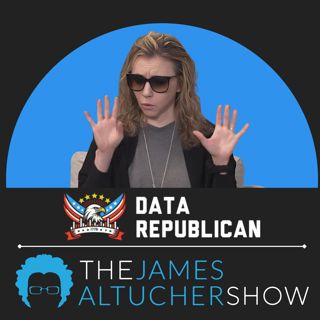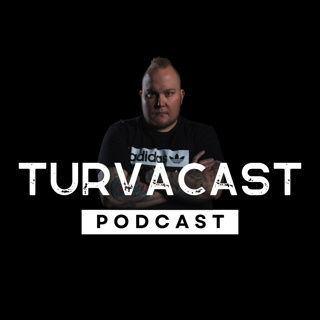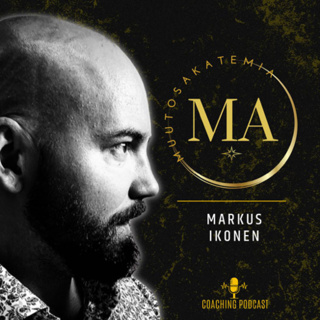
How-to Thrive in the Future of Podcasting: Insights from PodcastOne Top Industry Executives, Kit Gray & Robert Ellin
A Note from James:So I’ve been podcasting for, gosh, 11 years—over 1500 episodes. And through that whole journey, PodcastOne always stood out to me. They recently went public, and today I’ve got Rob Ellin and Kit Gray joining me. What’s the future of podcasting? If you're thinking about starting a podcast—or wondering how to grow one you already have—this episode's for you. These guys helped shape the entire industry, and they're sharing what works now, what doesn't, and how creators and networks can stay ahead.Episode Description:James Altucher sits down with Kit Gray and Robert Ellin, the powerhouse duo behind PodcastOne, to explore where podcasting is headed next. From YouTube’s dominance to AI-driven analytics, they dissect the changing landscape of content creation, monetization, and brand-building. They also discuss PodcastOne’s public market journey and how creators can turn niche ideas into multi-platform empires. Whether you're a podcast listener, creator, or investor, this episode gives you a real look at how podcasting is evolving from bedroom hobby to billion-dollar business.What You’ll Learn:Why YouTube has become the most important platform for podcastersHow to build a podcast brand that lasts—and makes moneyWhy Gen Z is reshaping the future of content creationThe real metrics that drive podcast growth and advertiser interestHow PodcastOne is planning to become a billion-dollar companyTimestamped Chapters:[00:00] Introduction: The Future of Podcasting[00:06] The Rise of YouTube in Podcasting[01:08] James Altucher’s Podcasting Journey[01:53] Interview with Rob Ellin and Kit Gray[02:13] Evolution and Challenges in Podcasting[02:49] The Impact of Video and Live Shows[05:36] The Importance of Audience Engagement[06:19] Diverse Podcast Formats and Their Success[07:35] Building Relationships and Networks[09:32] Monetizing and Expanding Podcast Content[22:05] The Role of Gen Z in Podcasting[25:10] Debating College and Entrepreneurship[25:43] The Evolution of Media and Content Creation[26:53] The Power of Celebrity Influence[27:55] Building and Branding in the Modern Era[31:03] The Impact of Podcast Advertising[34:07] The Future of Podcasting and AI[40:34] The Growth and Influence of PodcastOne[41:59] Podcasting During COVID and Beyond[45:13] PodcastOne’s Public Journey and Future PlansAdditional Resources:PodcastOne – Official SiteNorthwest Registered AgentBetterHelp Online TherapyLand Rover DefenderEntrepreneurs on Fire by John Lee DumasThis episode is brought to you by BetterHelp. Give online therapy a try at betterhelp.com/jamesSee Privacy Policy at https://art19.com/privacy and California Privacy Notice at https://art19.com/privacy#do-not-sell-my-info.
24 Touko 46min

Part 3: How to Write and Publish Your First Book in 30 Days - The 6 U’s, Clarity Tools, and Breaking Through Writer’s Block
Notes from James:This is where a lot of people quit—but you won’t. This episode is about pushing through the dip that comes when writing gets tough. I give you tools I’ve used across 25+ books to keep going, stay motivated, and write better.Episode Descriptions:This is Part 3 of my 30-day writing series—and we’re getting into the real tools that will make your writing not just better, but publishable. If you’ve ever stared at a blank page and felt overwhelmed, stuck, or unsure of where to go next, this is the episode that will break that wall down.I walk you through the “6 U’s” that every chapter—and especially your book introduction—must follow to grab readers, hook them emotionally, and sell the value of your book. You’ll also learn the “Warren Buffett 5/25 Rule” and how it helps you figure out exactly what to write about, plus a little-known editing tool (the Flesch-Kincaid score) that will instantly improve your writing’s clarity.If you’ve hit writer’s block, feel stuck mid-draft, or need structure to keep going, you’ll find every tool you need right here.This episode is sponsored by BetterHelp. Give online therapy a try at betterhelp.com/JAMES and get on your way to being your best self.What You’ll Learn:The 6 U’s of persuasive writing: Urgency, Unique, Useful, Ultra-Specific, User-Friendly, Unquestionable ProofHow to sell your book in the introduction using sales psychology techniquesWhy Warren Buffett’s 5/25 Rule might be the most important tool for picking a topicHow to use the Flesch-Kincaid Score to make your writing clearer and more readableNine real techniques I’ve used to overcome writer’s block—even on my worst daysWhy storytelling isn’t just a craft—it’s your most important writing toolTimestamps:00:00 Crafting a Compelling Book Introduction01:58 The Six U's of Selling Your Book07:52 Applying the Six U's to Your Writing09:34 The Warren Buffett 5/25 Rule for Focus22:01 The Importance of Readability: Flesch-Kincaid Score28:27 Introduction to Overcoming Writer's Block28:54 Nine Techniques to Overcome Writer's Block36:33 Additional Writing Techniques and Tips47:57 The Importance of Storytelling in Writing51:07 Frameworks for Writing and Publishing Your BookP.S. Want to go deeper? Check out my full course on Udemy or visit chooseyourselfacademy.com: How to Write and Publish a Book in 30 Days – available now.See Privacy Policy at https://art19.com/privacy and California Privacy Notice at https://art19.com/privacy#do-not-sell-my-info.
22 Touko 48min

Part 2: How to Write and Publish Your First Book in 30 Days - Frameworks, First Lines, and the Craft of Storytelling
Notes from James:The biggest lie about writing is that it takes years. I’ve written multiple books in less than a month—including bestsellers. With the right system, anyone can do this.In this episode, I break down how to structure your first book and why your life experience, not your grammar, is your superpower. You’ll also hear my take on AI writing, and why your personal story is something no algorithm can ever replicate.Episode Highlights:Yes, you really can write and publish a great book in 30 days. In Part 2 of this writing series, I walk you through the actual systems that make it not only possible—but repeatable.You’ll learn four powerful “meta-outline” frameworks you can use to organize any non-fiction book quickly and clearly. I’ll show you how I wrote Think Like a Billionaire in under 30 days using one of these frameworks, and how authors I know have launched entire careers with similar methods (some even in just three days). I also dive deep into one of the most important—but most overlooked—parts of writing a book: your first sentence. You’ll hear legendary first lines from some of the world’s best authors and learn why they work.This episode is a blend of process and artistry—because writing a great book requires both.This episode is sponsored by BetterHelp.Give online therapy a try at betterhelp.com/JAMES and get on your way to being your best self.What You’ll Learn:4 concrete frameworks that will help you write a 20+ chapter book fastThe myth of needing years to write a book (and how to break it)How I turned podcast interviews with billionaires into a full book in less than a monthWhy your first sentence matters more than your title—and how to make it irresistibleHow to write with authenticity, vulnerability, and momentumWhy AI can’t replace you—and never will—when it comes to storytellingTimestamps00:00 Introduction: Writing a Book in 30 Days00:54 The Four Frameworks for Writing02:03 Example: Think Like a Billionaire05:10 Overcoming Writing Myths13:14 AI and the Future of Writing20:47 The Power of a Strong First Line23:51 Exploring the Opening Lines of Iconic Novels24:14 Ralph Ellison's Invisible Man: A Civil Rights Era Classic25:04 Jack Kerouac's On the Road: A Journey of Rediscovery27:23 Gabriel Garcia Marquez's 100 Years of Solitude: A Nobel-Winning Masterpiece30:54 Kurt Vonnegut's Slaughterhouse-Five: A War Story with a Twist34:20 Jennifer Egan's Welcome to the Goon Squad: A Pulitzer Prize Winner35:25 Charles Bukowski's Post Office: A Tale of Mistakes and Realities38:57 William Gibson's Neuromancer: The Birth of Cyberpunk40:16 The Importance of First Lines in Storytelling42:36 Crafting Relatable and Vulnerable NarrativesP.S. Want to go deeper? Check out my full course on Udemy or visit chooseyourselfacademy.com: How to Write and Publish a Book in 30 Days – available now.See Privacy Policy at https://art19.com/privacy and California Privacy Notice at https://art19.com/privacy#do-not-sell-my-info.
18 Touko 43min

How to write and publish your book in 30 days: Part 1 - The Foundation of a Successful Writing Life
Notes from James:I’ve written 25 books—some huge hits, some total flops—and what I’ve learned is this: anyone can write a book, but not everyone gives themselves permission to start. This episode is the foundation. I break down the mindset, motivation, and structure you need to go from blank page to published book—even if you’ve never written a word before.So you want to write a book. Where do you even start? In this kickoff to my new series on writing and publishing a book in just 30 days, I walk you through everything you need to know before you ever touch the keyboard.This episode isn’t just for aspiring authors—it’s for anyone who’s ever wanted to turn an idea into something real, something lasting, and maybe even something that launches a new career. I’ll tell you exactly why writing a book is more important (and more achievable) than ever, and how your book can become a business card, a personal legacy, and a gateway to new opportunities—even if you’re not a “writer.”I also introduce the one structure that every great story (fiction or nonfiction) follows: the arc of the hero. It’s the single most powerful tool for crafting stories that actually move people.This episode is sponsored by BetterHelp. Give online therapy a try at betterhelp.com/JAMES and get on your way to being your best self.What You’ll Learn:The real reasons to write a book (none of them involve fame)Why books have a longer shelf life—and career impact—than blog posts or social mediaThe 3 essential questions to ask before you start writing: “Who are you? Why are you? Why now?”Why your first draft should be messy—and why that’s a good thingThe biggest myths that stop new writers (and how to ignore them)How the arc of the hero applies to everything—from Star Wars to tweetsTimestamps00:00 Introduction: The Power of Writing a Book00:37 Why Write a Book?01:18 My Journey as an Author03:39 The Importance of Knowing Your 'Why'08:46 Common Myths About Writing15:39 The Arc of the Hero in Storytelling19:35 Star Wars: A Hero's Journey22:17 The Timeless Tale of Moses28:16 Walt Disney's Heroic Arc32:52 The Arc of the Hero in Nonfiction35:25 Romance Novels: Love's Heroic JourneyP.S. Want to go deeper? Check out my full course on Udemy or visit chooseyourselfacademy.com: How to Write and Publish a Book in 30 Days – available now.See Privacy Policy at https://art19.com/privacy and California Privacy Notice at https://art19.com/privacy#do-not-sell-my-info.
16 Touko 37min

Bitcoin Meets Gold: Sunny Ray on Tokenization’s Future
A Note from James:Sunny Ray is working on an incredible project involving Bitcoin and his company, Matador. They’re digitizing gold—turning it into crypto—and he’s a Bitcoin maximalist. That’s different from my stance: I think there are many crypto tokens that are useful for specific purposes. But Sonny’s view is clear—Bitcoin is the foundation.We talk about what digital gold really means, why tokenization is so important, and how the biggest institutions in the world—like BlackRock—are embracing this shift. We also get into why exchanges are hard to use, the future of Ethereum, how gold works culturally in places like India, and why Matador is building its entire strategy on top of Bitcoin. This is a replay from a crypto call I recently held with subscribers.If you have questions, ask me on Twitter: @jaltucher.Episode Description:In this episode, James talks with Sunny Ray, president of Matador, a public company digitizing gold using the Bitcoin blockchain. Sunny shares insights from his early days at Kraken and his experiences launching India’s first Bitcoin exchange, Unocoin. They cover the challenges of crypto adoption, the promise of tokenization, and how Bitcoin may be the most durable digital asset of our time.This episode goes beyond the usual headlines—it’s a grounded, strategic look at where Bitcoin is heading, how real-world assets like gold are being brought on-chain, and what institutional moves (like BlackRock’s) mean for the next phase of crypto. Whether you’re a skeptic, a casual investor, or a hardcore maxi, this conversation offers real insight into the future of money.What You’ll Learn:Why tokenizing gold on Bitcoin may be the next major step in financial evolutionHow Matador is using ordinals to link physical gold with blockchain dataWhy Bitcoin's scarcity, transparency, and decentralization set it apart from Ethereum and other altcoinsWhat role India’s gold culture plays in global crypto adoptionHow public companies are becoming Bitcoin treasury plays—and what that means for investorsTimestamped Chapters:[00:00] Intro – Why this episode matters[01:00] What is tokenization and why does it matter?[03:00] Sunny Ray’s background: Kraken and Bitcoin since 2012[06:00] Why gold is trusted globally—especially in India[08:00] Gold vs. Bitcoin: Properties and potential[11:00] The macro view: ETFs, government support, and regulation[13:00] Ethereum’s origin and limits[15:00] Why Bitcoin is regaining ground in the developer world[17:00] NFTs and ordinals on Bitcoin[20:00] Is tokenization finally crypto’s “killer app”?[22:00] Bitcoin’s dominance and long-term strength[25:00] Matador’s strategy vs. Solana-style plays[29:00] How Matador’s digital gold product works[33:00] The benefits of gold on-chain: 24/7 trading, fractional ownership[35:00] Gold art, SAT inscriptions, and Defi integration[38:00] BlackRock, tokenized treasuries, and democratizing finance[40:00] Why tokenization could outpace ETFs and traditional finance[44:00] India’s crypto readiness and female tech adoption[46:00] James challenges Sunny’s Bitcoin maximalism[49:00] The mythology of Satoshi and Bitcoin’s uniqueness[51:00] What else could be tokenized? Real estate, metals, stocks[52:00] Trump, RFK, and the US crypto policy shift[55:00] Final predictions – $3M to $50M Bitcoin?Additional Resources:Matador Public Company – Official company siteTicker: MATAF (U.S. OTC listing)Bitcoin Whitepaper (original)This episode is sponsored by BetterHelp. Give online therapy a try at betterhelp.com/jamesSee Privacy Policy at https://art19.com/privacy and California Privacy Notice at https://art19.com/privacy#do-not-sell-my-info.
9 Touko 57min

Dr. Mehmet Oz (Centers for Medicare and Medicaid Services) on Food, Medicine, and the Future of Healthcare
A Note from James:So Dr. Oz—television personality turned government official—this is such an interesting thing. He's going to be the new administrator of the Center for Medicare and Medicaid Services, CMS. He’s going to be in charge of all Medicare and Medicaid. What does he know or think about these parts of our government?Medicare and Medicaid, combined with Social Security, make up the biggest part of government spending. So it'd be interesting to know what he thinks. On his show, he’d talk about everything from medicine to alternative medicine to other healing methods. I want to know how he's going to handle things in the government.This is a republishing of a past podcast I did with Dr. Oz, but it still describes his approach to medicine. And I think, as a citizen, this is useful. That’s why I wanted to share it again. He’s going to be working closely with RFK Jr. and Marty Makary (who’s also been on this podcast and is now head of the FDA).So here’s Dr. Oz.Episode Description:In this re-released conversation, James speaks with Dr. Mehmet Oz about his philosophy on medicine, self-care, and the critical role nutrition plays in overall well-being. As Dr. Oz steps into a major government role as the head of CMS, this episode offers valuable insight into the beliefs and strategies he may bring to one of the most powerful positions in U.S. healthcare.Together, they cover the power of second opinions, why most people misunderstand sugar, how gut bacteria drive health, and what it means to choose yourself when it comes to well-being. They also unpack highlights from Dr. Oz’s book Food Can Fix It, including practical strategies for brain health, stress, and weight loss.What You’ll Learn:Why second opinions can drastically change your medical outcomes.The connection between stress, sugar, and your brain's coping mechanisms.What to eat (and avoid) for long-term brain health and energy.How gut bacteria influence digestion, immunity, and mood.Dr. Oz’s personal routine for energy, sleep, and productivity.Timestamped Chapters:[00:00] Dr. Oz’s New Role in Government[01:00] Dr. Oz’s Philosophy: Empowering Patients[02:45] The Power of Second Opinions[04:00] Behind the Book: Food Can Fix It[06:00] Parenting, Health, and Self-Sacrifice[07:30] Why We Stress Eat—and What to Do Instead[09:30] Fixing the Root Cause with Food[12:00] Brain Food and Omega-3 Fats[15:30] Antioxidants, Alcohol, and Wheat Brain[17:30] Why Sugar Without Fiber Is Dangerous[18:30] Juicing vs. Smoothies[19:30] Food Traditions, Rituals, and Healing[20:15] Using Food as Medicine for Pain[21:00] The Role of Gut Bacteria[23:30] Smart Weight Loss Strategies[26:30] Rethinking Dairy, Gluten, and Processed Foods[28:00] Eating for All-Day Energy[30:30] Daily Routine: Sleep Hygiene and Focus[33:00] Final Thoughts and Dr. Oz’s Upcoming PodcastAdditional Resources:📘 Food Can Fix It by Dr. Mehmet Oz🧠 Yuval Noah Harari's Sapiens (mentioned in the episode)🥗 Harvard School of Public Health: Omega-3 Fatty Acids💡 Dr. Oz's WebsiteTo get 6 bottles of wine for $39.99, head to NakedWines.com/JAMES and use code JAMES for both the code AND PASSWORD.This episode is brought to you by BetterHelp. Give online therapy a try at betterhelp.com/jamesSee Privacy Policy at https://art19.com/privacy and California Privacy Notice at https://art19.com/privacy#do-not-sell-my-info.
7 Touko 36min

Everything Doctor's & Hospitals are Afraid to Tell You: FDA Commissioner Dr. Marty Makary on How to Negotiate Your Medical Bills, Advocate For Yourself & Restore U.S. Healthcare
A Note from James:Marty Makary is the new head of the FDA, but he is also an old friend of the podcast. He's been on several times, and it's really important to know how this is going to be a new and different FDA, and it's going to be molded by Marty's very specific opinions about healthcare and the medical industry—and here they are.Episode Description:In this episode, James reconnects with Dr. Marty Makary, now heading the FDA, to discuss what’s broken in the American healthcare system—and what can actually be done about it. Marty pulls back the curtain on the realities of medical pricing, why unnecessary surgeries happen more often than most suspect, and how medical education is failing future doctors and patients alike. They explore the origins of Marty’s bestselling books, the TV adaptation of Unaccountable, and why your hospital bill may have little to do with actual care. This conversation is a rare window into what’s really happening inside hospitals and policy rooms—and what the future of smarter, more humane healthcare could look like.What You’ll Learn:Why 11% of surgeries and 21% of all medical care may be unnecessary—and what’s driving that trend.How hidden costs, out-of-network billing, and surprise charges are crippling Americans financially.What reforms are gaining traction in Congress and why hospitals may be resisting them.How nutrition, inflammation, and simple wellness practices are overlooked in modern medicine.What questions you should ask your doctor to avoid inappropriate or excessive care.Timestamped Chapters:[00:00] Introduction to Marty Makary and the New FDA[01:17] From Book to TV Show: The Journey of Unaccountable[03:42] The Price We Pay: Unveiling Healthcare Costs[09:06] Medical Education and Its Flaws[15:01] The Hidden Costs of Healthcare[34:52] Inappropriate Care and Its Consequences[43:14] The Referral Business in Medicine[44:00] Unnecessary Surgeries: A National Concern[44:48] Malpractice Fears and Their Impact[47:33] The Overuse of Antibiotics[50:28] Inappropriate Medical Care: Real-Life Examples[53:45] The Role of Nutrition and Wellness in Healthcare[58:15] Innovative Medical Education and Training[01:00:36] The Importance of Experience in Medical Practice[01:18:32] The Future of Healthcare: Inflammation and Biome Health[01:20:53] Final Thoughts and Practical Health TipsAdditional Resources:Dr. Marty Makary’s websiteUnaccountable by Marty MakaryThe Price We Pay by Marty MakaryThe Resident (TV Series)Healthcare BluebookRestoring MedicineTo get 6 bottles of wine for $39.99, head to NakedWines.com/JAMES and use code JAMES for both the code AND PASSWORD.See Privacy Policy at https://art19.com/privacy and California Privacy Notice at https://art19.com/privacy#do-not-sell-my-info.
6 Touko 1h 30min

DataRepublican’s Mission: Uncovering Government Fraud to Save the Country with Determination
A Note from James:The Data Republican—it almost sounds like a superhero name. And in a way, she is. She’s been single-handedly uncovering massive amounts of government waste and inefficiency. It’s honestly unbelievable. And regardless of whether you're a Democrat, Republican, Independent, or anything else, I think we can all agree: there shouldn’t be waste or fraud in the government.You’ve heard the old stories—like the military buying a pencil for $6 million. Those weren’t urban legends. They were real, and you could track them through publicly available data. The problem now is that the data is harder to find and much harder to analyze. That’s where Data Republican comes in. She’s built tools that comb through this public data—yes, it’s all technically accessible—and uses AI to flag things that are, if not outright fraudulent, at least seriously wasteful. This is about saving taxpayer dollars.She’s made such an impact that even Elon Musk has used her tools to help identify government waste.You can find her on Twitter or at datarepublican.com, where she shares tools you can use to help spot waste yourself. But here's something even more remarkable: she’s both deaf and mute. She’s been deaf since early childhood and has never made a phone call in her life. She doesn’t speak either.So, in this episode, we’re also joined by The Data Interpreter—her translator—who helps communicate her responses. You’ll hear both of them in action.I wanted to understand: what kind of waste has she uncovered? What does she see? What is she working on? What tools can we use from her site? How did she get started with this?We’ve edited out the pauses for translation to keep the conversation flowing, but you’ll hear the full exchange between her and her interpreter. It was a fascinating and eye-opening conversation. Listen and learn.Episode Description:James Altucher sits down with the anonymous data investigator known as "DataRepublican" to explore government waste, corruption, and influence networks that operate in plain sight. From bizarre examples of foreign aid spending to powerful NGOs and their entanglement with corporations and Congress, this episode unpacks how taxpayer money circulates through a tangled web of lobbying, insider boards, and private interests. DataRepublican also shares her origin story, from analyzing charities like the Girl Scouts to building AI tools that track federal awards—and the personal fallout of being doxed for her work. If you've ever wondered where your tax dollars actually go, this is an eye-opening conversation.What You’ll Learn:How private corporations use lobbying and advisory boards to steer government spendingWhy USAID and its partner NGOs may be central hubs for inefficiency and influenceThe real reason massive companies like Disney and Land O'Lakes receive taxpayer moneyHow DataRepublican’s AI tools help trace connections between government officials and private interestsWhat you can do to research and report suspicious spending yourselfTimestamped Chapters:[00:00] Introduction: Uncovering Government Waste and Fraud[00:43] The US Global Leadership Council (USGLC) and Its Influence[01:54] Corporate Funding and Government Aid[03:14] The Complex Web of Lobbying and Influence[08:03] Egregious Examples of Misallocated Funds[10:30] The Role of NGOs and Former Government Officials[18:26] Personal Journey: From Charity Analysis to Government Oversight[20:57] Exploring Government Fraud and Waste[22:07] Charity and Government Spending Issues[22:36] Department of Defense and Misallocated Funds[23:20] Congressional Conflicts of Interest[24:38] Social Security and Identity Issues[25:58] Personal Journey and Overcoming Challenges[26:53] Naked Wines Sponsorship[29:38] Future Projects and Doxing Incident[32:18] Addressing Government Waste and Solutions[35:14] Final Thoughts and Call to ActionAdditional Resources:DataRepublican on TwitterUSGLC: U.S. Global Leadership CoalitionUSAID (U.S. Agency for International Development)Naked Wines - Use Code “James”To get 6 bottles of wine for $39.99, head to NakedWines.com/JAMES and use code JAMES for both the code AND PASSWORD.See Privacy Policy at https://art19.com/privacy and California Privacy Notice at https://art19.com/privacy#do-not-sell-my-info.
30 Huhti 38min





















